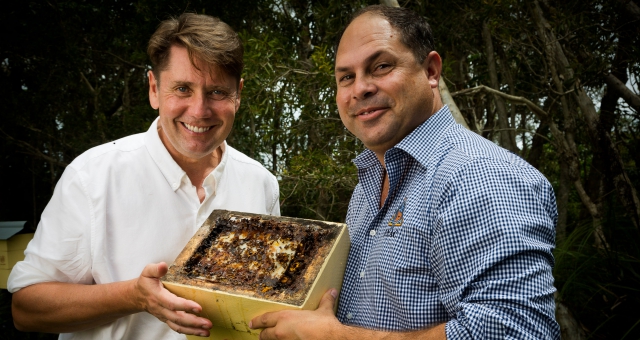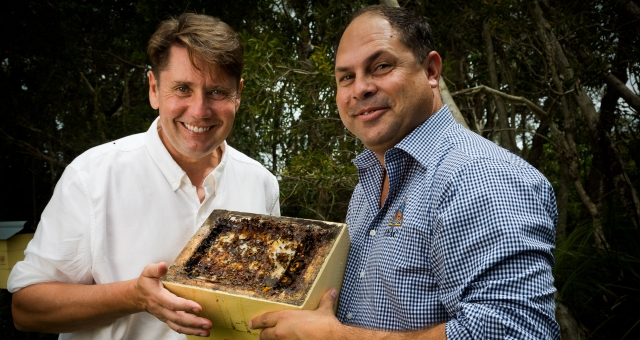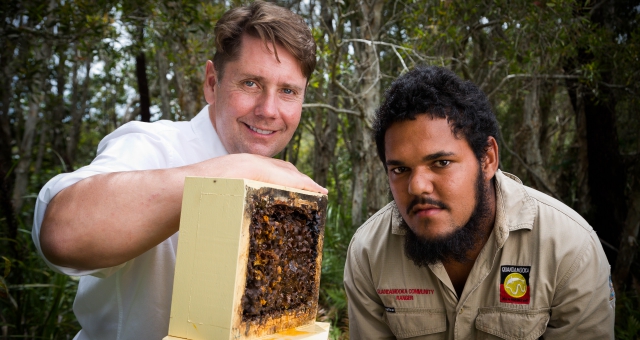A ground-breaking partnership between the local Aboriginal community and one of Australia’s leading integrated resort companies will see ‘sugarbag’ native bee honey harvested on North Stradbroke Island.
The Quandamooka Yoolooburrabee Aboriginal Corporation (QYAC), representing the island’s Traditional Owners, the Quandamooka People, is working with The Star Entertainment Group to install 32 native bee hives on the island, traditionally known as ‘Minjerribah’.
In accordance with local Aboriginal customs, the honey will be collected at regular intervals throughout the trial by Quandamoooka People, Elders, and QYAC rangers – with each hive expected to generate up to 1kg of honey per year.
The native bee honey will be used by The Star Entertainment Group as an exclusive, signature ingredient in its menus, including during the Gold Coast 2018 Commonwealth Games in April, as well as for gifts.
QYAC CEO, Cameron Costello, said pending the trial’s outcomes, the initiative will explore the feasibility of establishing an Aboriginal native bee honey microfood business on the island, further research and development into honey production, and a potential Aboriginal eco-cultural tourism experience.
“We are proud to be part of this industry-first initiative with The Star Entertainment Group, with the next 18 months spent working together on how we can generate sustainable and capacity-building outcomes for our Aboriginal community,” he said.
“We value The Star’s support to develop economic opportunities for a regional Aboriginal community like ours, which will also complement The Star’s future developments such as Queen’s Wharf Brisbane.
“It would be an incredible opportunity and boost for our community to have our honey play a starring role as the key ingredient in dishes at their premium dining outlets and five and six-star developments,” Costello said.
The Star Entertainment Group CEO, Matt Bekier, said the company was proud to join QYAC in developing an initiative with the potential to create a commercial Aboriginal industry based on a tradition thousands of years old.
“This partnership will help increase our understanding of local Aboriginal heritage, culture, food, and customs, which is incredibly important to our south-east Queensland properties,” he said.
“Food is a key part of our retail strategy for both our $3 billion Queen’s Wharf Brisbane integrated resort development, which will feature 50 new restaurants, cafes, and bars in the CBD; as well as our ongoing expansion at The Star Gold Coast, worth up to $850 million, which has already launched six new restaurants and one bar with more to come,” Bekier said.
Australia’s leading native bee expert and former CSIRO entomologist, Dr Tim Heard, said the native bee species being used for the trial are stingless and live in colonies, unlike most Australian bees.
“We have around 1500 species of bees in Australia with this particular species producing a unique and earthier taste sensation that is lighter and has a runnier consistency than normal honey, while still being incredibly delicious,” Dr Heard said.
“The bee hives are being placed in different terrains and locations – such as by the coast and in the bushland – to see if their locality provides different flavours or different honey production rates, which will be reviewed throughout the trial.”
Costello said he was proud that the initiative provided a way for traditional knowledge and skills to be transferred across generations by involving local Quandamooka People, Elders, rangers, and potentially students from Dunwich State School.
“Quandamooka People will collect the honey and we would like to involve school students to paint the bee hives with Aboriginal art,” Costello said.
“This will create innovative opportunities unique to this part of the world and drive more skills capacity in our local community into the future.”





